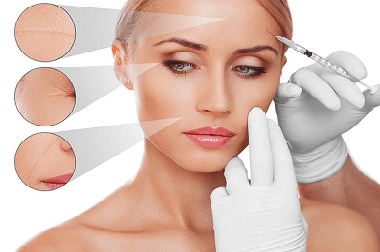Curative cosmetology and cosmetic medicine >>>> Biorevitalization
Biorevitalization.

Dry, flabby, dehydrated skin requires additional measures to restore its elastic structure. Cosmetology offers a biorevitalization method as one of the possibilities for reanimating collagenogenesis processes. Small wrinkles resulting from poor care, ultraviolet rays, and water imbalance in the body can be slightly smoothed out using subcutaneous (shallow depth) administration of hyaluronic acid. The biorevitalization procedure gives results for several months (up to a year), this is exactly the period during which hyaluronic acid is excreted (absorbed).
Hyaluronic acid plays an important biochemical role in the hydrodynamics of tissues, it is able to retain water molecules. But when exposed to ultraviolet rays, the synthesis of hyaluronic acid in skin cells stops, and the existing hyaluronic acid molecules begin to disintegrate. For this reason, ultraviolet light affects the rate of decomposition of hyaluronic acid, and it is not recommended to expose the skin of the face to the sun after the biorevitalization procedure in order to maintain the duration of the effect.
The biorevitalization procedure has contraindications:
- Acute and chronic skin diseases;
- Infectious and inflammatory processes on the skin of the face (acne, subcutaneous acne, boils, etc.);
- Tendency to allergic reactions;
- Tendency to form keloid scars;
- During pregnancy and breastfeeding;
- Colds;
- Chronic diseases in the acute stage.
Side effects from biorevitalization:
- Swelling
- Allergic reactions
- Slight redness.
To prevent side effects, it is worth testing the administration of drugs with hyaluronic acid in the area of the skin that is not publicly visible.

Read

Read



























